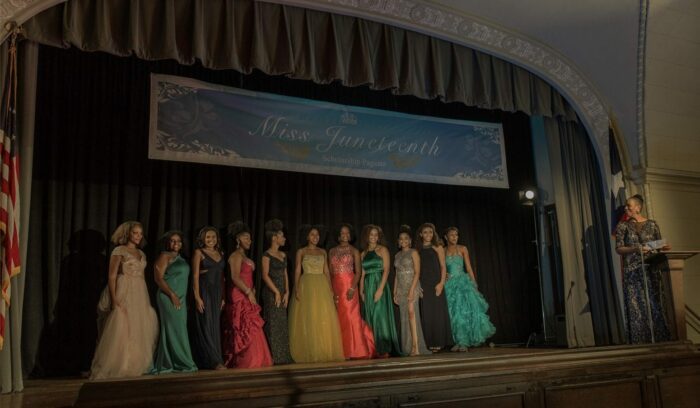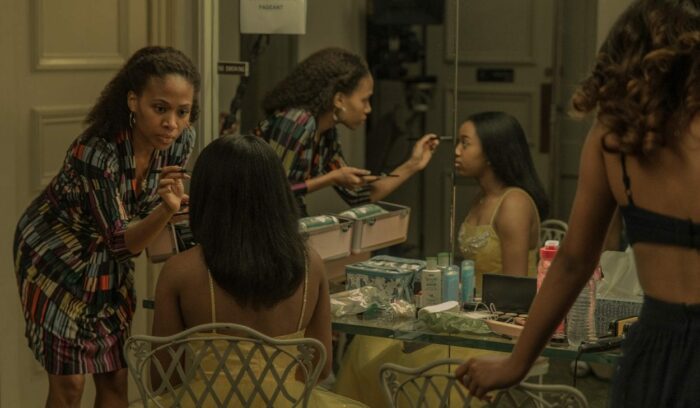If you are the type of person who normally pinches your nose or thumbs it at “beauty” pageants, that feeling is understandable. Parading young women through hurdles of protocols and so-called traditions before an audience for unrealistic ideals can be counterproductive and even damaging to self-image and independence. The Miss Juneteenth pageant of Fort Worth, Texas seen in the independent film and Sundance Film Festival selection that bears the same name strives to be different. Straight from its mission statement, it stands proud as “a forum for young women to enhance their self-esteem, explore self-expression and provide areas for personal development training.”

With its “imperative,” as it is called in the movie. Excellence is the goal. Training on poise, public speaking, positive reinforcement, networking, future career opportunities, and educational rigors, Miss Juneteeth is more than a stage act. The winner receives something more vital than a title, tiara, sash, and parade ride. Each annual Miss Juneteenth receives a full-ride scholarship to the historically black college or university of the winner’s choice. That is excellence and importance beyond showmanship.
Like any competition such as that, though, an event meant to bring out the best or launch a talent can also bring out the worst or sink one. Miss Juneteenth rises and falls by that hardscrabble teeter-totter. For Turquoise Jones, played by Nicole Beharie, her 2004 Miss Juneteenth victory might as well have been the peak of her life at this point. The poor circumstances of her youth, namely getting pregnant, led her to not finish school or take advantage of the winner’s scholarship. Turquoise has spent the last 15 years busting her tail at a local BBQ joint and whatever other side jobs can rub the nickels together to pay the bills.
The offspring of her teenage derailment was a daughter named Kai, played by the vibrant newcomer Alexis Chikaeze. The stories and rumors cautioning her mother’s success and failures are inescapable in their section of town. Kai’s father Ronnie (TV regular Kendrick Sampson) is still in the picture as a semi-steady beau for Turquoise who chips in money where he can. Every dollar being brought into the house at the moment is going towards Kai’s own bid to win the Miss Juneteenth Pageant.

Pushing Kai to win Miss Juneteenth is a deep and longing desire for Turquoise. This is a push to correct her own mistakes through her child. With money always the eternal issue, the reason is less about showing up other women and their side-eye jealousy and more about the full-ride scholarship which can propel Kai on a path higher and better than her own. Turquoise sees too much of herself in her daughter and knows this win can be the springboard she missed. That’s a very fair want for a parent.
Alas, much of the parental conflict in Miss Juneteenth follows the sacrifices being made for either a want or a need. Is this pageant a want more than a need? Is all of this worry about the wrong kind of thing? Is this arduous and conquest worth working oneself to the bone for the hundreds of dollars worth of fees, dresses, and semi-superficial beautification? For Turquoise, the answer is yes, but Kai’s dedication wavers and she pushes back against the inflexible idea of following her mother, right down to using the same dress and same spoken word poem selection for the competition. Their dreams are competing rather than cooperating.
While college may be the goal, there is still a selfish angle for Turquoise every time she and Kai still play pretend with Turquoise’s old tiara and dress. When we meet Turquoise’s alcoholic and holy-rolling own mother (Liz Mikel of Friday Night Lights), the thicker sense of “what I want for you” motherhood and its forced priorities as a legacy comes out in Miss Juneteenth. Motherhood is a legacy of branches. Those generational branches can grow close or far but will always be connected and fed by the same roots. All the while, a woman’s worth is all her own, regardless of the branches.

Miss Juneteenth is a powerful performance statement for Nicole Beharie of Shame, 42, and TV’s Sleepy Hollow. Strength does not come from anger and she crafts a character built with the bedrock at the core. Nicole’s resolute body language flexes with every arduous challenge and earned respite. For those moms out there, she has “the look,” and you know exactly what it is when you get it. With few words, Nicole can hold a scowl as equal as she can radiate a smile. When she does speak as Turquoise, her terse and abrupt replies and measured diatribes rattle with infinite posture and patience.
Willed by Beharie’s solid lead, this small film is a gratifying drama fit for the holiday of its namesake. This feature writing and directing debut of Channing Godfrey Peoples (TV’s Queen Sugar) is an absorbing and honorable celebration of traditions, futures, culture, and family free of harsh judgment and wrongly-placed stereotypes that would have come from disingenuous sources. Miss Juneteenth has as much sincerity as it has struggle. The worthy themes ring true for a positive and willing audience that can pause looking down on pageants and see the bigger preparatory importance.
Last but not least and accompanied by James Wheldon Johnson’s anthem of “Lift Every Voice and Sing,” Miss Juneteenth is a testament to a celebrated day of liberation and independence. On June 19, 1865, Major General Gordon Granger brought these orders to Galveston, Texas overdue by two years after President Lincoln’s Emancipation Proclamation:
“…all slaves are free. This involves an absolute equality of personal rights and rights of property between former masters and slaves, and the connection heretofore existing between them becomes that between employer and hired labor.”
Like the Civil War itself, slavery didn’t end with just one act. If you don’t know the history or significance of June 19, 1965, do yourself a favor and get educated.



